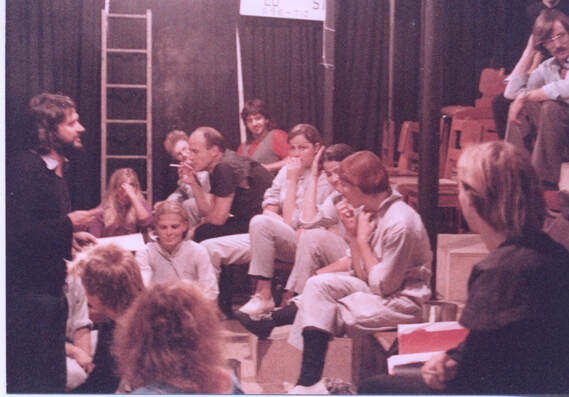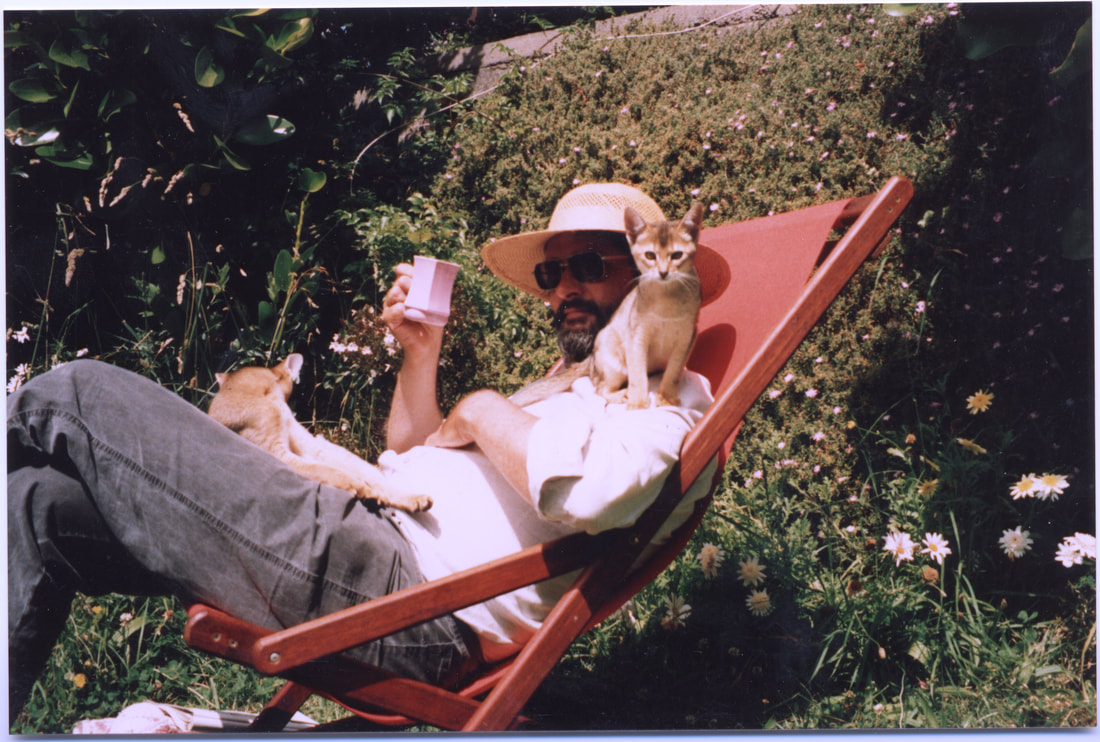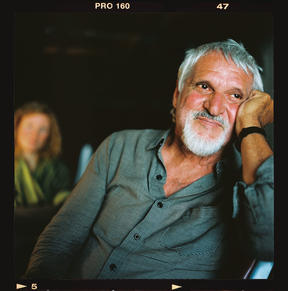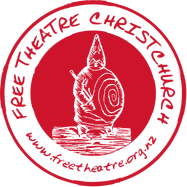Peter Falkenberg: Founder and Artistic Director
 1984: The Future is Now (1984)
Peter Falkenberg is the founder and Artistic Director of Free Theatre Christchurch and Director for Te Puna Toi Performance Research Centre. He was educated at the universities of Munich and St Andrews and trained as a director at Munich Kammerspiele. He moved to New Zealand in 1975 where he founded Free Theatre and later the Theatre and Film Studies programme at the University of Canterbury.
In a chapter titled 'Theatre of Unease' in Performing Aotearoa (2007), Peter proposed a theatre that: "would intentionally look for the ephemeral, the indeterminate and the risky in classical and new texts as well as in devised performances". This kind of theatre, he says, would work with the actors' social and psychological existence: "the desires and problems of the performers, uncouth, rough and sometimes seemingly lacking in style, would be made the object of training and rehearsal, and be mixed with the text or content of the performance. Out of this crucible, a performance could take form which would offer audiences a less easy, but more satisfying, reflection of themselves." Of devised performance, Peter wrote in the international journal Theatre Topics (2005): "Perhaps instead of conforming to a fixed script which is always in danger of being frozen in some other place, time, and ideology, it is better to look for identity through a provisional art, where texts and participants become the material of performance in a dialectical process. It may be, in the present situation, that there are no pure local identities any longer--if there ever were. A country that is built upon colonization must be seen in the act of continually devising an identity for itself. How else to represent such acts if not by following the same provisional path? Ephemerality is always being denied through text. Maori only have an oral tradition, and written fixed text--even if it preserved their own language--was used as a colonizing instrument on them. Their tradition of performance can be seen as devising and re-devising their cultural identity in a constant process through the generations. Perhaps we can learn from the Maori, and not just in New Zealand. Perhaps it is time to see devised performance as a way of keeping the freedom as well as the relevance of the art, which is always fleeting . . . like identity, like life" (From: 'Why Devise? Why Now? Why New Zealand') |
The Free Theatre under Peter's creative leadership has developed and consolidated into an internationally recognized group of theatre practitioners and researchers who are consistently at the forefront of the discipline's development. The rigorous testing out of ideas, of stretching the borders of the genre, a strong commitment to engaging the audience's mind and senses make the Free Theatre an important player in the international landscape of independent theatre companies. That Free Theatre has managed to exist for so long, and continues to be cutting-edge in its spirit of experimentation, is a credit to the work of Peter Falkenberg, the originator of the company, and to the loyal teams of actors he has inspired. Peter Falkenberg has established a wide reputation in New Zealand for an uncompromising dramatic vision and an acute awareness of the fragility of our national identity. He comes from a theatrical tradition that is not afraid to use the stage for philosophical inquiry. This grounding of the performance project in the interstices of fracture, ambiguity and uncertainty has been one of the defining gestures of his work... 'Saturday Morning with Kim Hill' (Radio NZ) interview, Peter Falkenberg - 40 years of the Christchurch Free Theatre, 2019. Saturday Morning, 10:35 am on 20 July 2019 'Upbeat' (Radio NZ) interview on Distraction Camp in Wellington, 2010. Interview with Peter Falkenberg and Emma Johnston Upbeat, 1:00 pm on 30 August 2010 'Arts on Sunday" (Radio NZ) interview re Distraction Camp, 2009. Arts on Sunday, 1:50 pm on 22 November 2009 'Arts on Sunday' (RadioNZ), re 25th Anniversary. Arts on Sunday, 2:25 pm on 18 May 2008 Interview with Peter Falkenberg and George Parker Falkenberg. Taonga. |
- HOME
- ABOUT
- UPCOMING
- EDUCATION
-
ARCHIVE
-
Productions 1979 - present
>
- Babylon Berlin
- Beggars Banquet
- Woyzeck
- The Tempest
- The Axe
- Endgame
- Digitising Performance
- Erewhon: Over the Range
- A Summer Night's Dream
- How Dare You
- A Winter's Tale
-
Ubu Nights
>
-
Past Ubu Nights
>
- Ma Ubu Night
- Ubu Through the Looking Glass
- Ubu in Wonderland Ubu Night
- Frankenstein Ubu Night
- Casablanca Ubu Night
- Faust Ubu Night
- Not Hamlet Ubu Night
- Punk Ubu Night
- The Art of the Deal Ubu Night
- Crossroads Ubu Night
- Ubu Shows Us the Way to Brecht's Whiskey Bar
- The Devil and the Blues Ubu Night
- Bowie Ubu Night
- Warhol Ubu Night
- Berlin Kabarette
- Beat Ubu Night
- Twin Peaks Ubu Night
- David Lynch Ubu Night
- Kafka Ubu Night
- Tango Ubu Night
- Ubu Ubu Night
- Lovecraft Ubu Night
-
Past Ubu Nights
>
- Ars Acustica
- Alice
- The Black Rider
- Frankenstein
- The Mauricio Kagel Project
- Te Puna Toi 2015: Footprints/Tapuwae
- Kafka's Amerika
- The Soldier's Tale
- Canterbury Tales
- I Sing the Body Electric
- Hereafter
- Passion, Pulse and Power
- The Earthquake in Chile
- Doctor Faustus
- The Marvellous Corricks >
- Distraction Camp
- Remake
- Ella and Susn
- Free Theatre - 25 years and counting...
- Faust Chroma
- Enigma Emmy Goering/Nico Sphinx of Ice
- Faust Feast
- Diana Down Under
- Philoctetes >
- Fantasia
- Christmas Shopping
- Grimm's Sleeping Beauty
- Achternbusch in the Antipodes
- Caucasian Chalk Circle
- Samson Airline
- Kabarett Kabul
- Footprints/Tapuwae
- Last Days of Mankind
- Medea
- Bakkhai / Diotek
- Krapp's Last Tape
- Murderer Hope of Women / The Philosopher's Stone
- Comrade Savage
- Love on a Bicycle
- Resolution Island
- Songs for the Judges
- Crusoe
- Oedipus Rex/Oedipus at Colonus
- States of Shock
- Empire Builders
- Yes
- Power
- Robinson Crusoe: Or I THat Was Born To Be My Own Destroyer
- Newsbites
- Dumped in Space
- MedeaMaterial
- Salome
- Electra
- Sphinx and Strawmen
- The Girl Who Sings Waterfalls
- Hamletmachine
- Oresteia
- A Respectable Wedding
- Bitter Tears of Petra von Kant
- Double Act and Postponeless
- Cloudkiwiland
- Preversions
- G.O.P. Helpomatic
- The Mortal Pleasure of Wander Lust
- Red Cross & Takeaway
- Lulu Earth Spirit
- The Meeting
- Action / Tongues
- Cowboy Mouth
- The Rise and Fall of the City of Mahagonny
- A Letter from L
- Dinosaurs and All the Rubbish / The Hunting of the Snark
- The Ride Across Lake Constance
- Electra
- In Three Minds
- The Rapist Over Suzannah
- 1984: The Future Is Now
- Leonce and Lena
- Kabernette
- The Joffongract
- My Foot, My Tutor
- King Lear
- King Ubu
- Jazz Cellar Dada / Heavy Metal Cabaret
- Kabarett
- Black Cat Cabaret
- The Gas Heart/Ox on the Roof/The Mirror Wardrobe One Fine Evening
- Round Dance
- Woyzeck
- Make-up Ground down / Texts for Decomposition
- Court Case: Arts Centre vs Free Theatre
- Image Gallery 1979 - present
- TV3 Clips
- Selected Reviews
-
Productions 1979 - present
>
- Te Puna Toi
- SUPPORT
- BLOG




